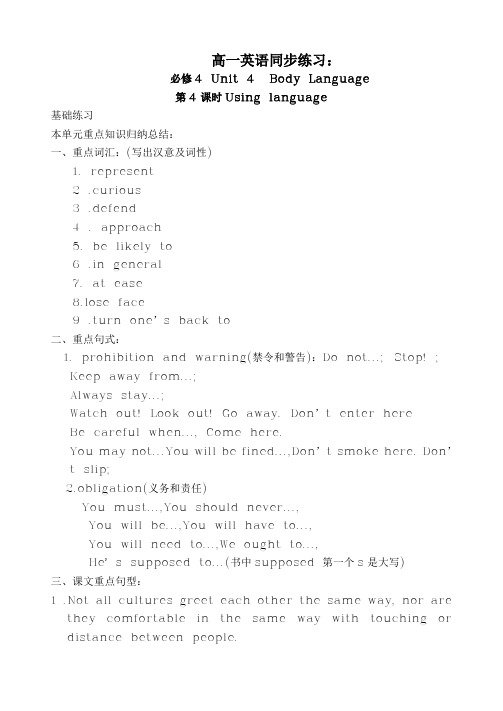人教版新课标高中英语必修4Unit4Using_language上课用
- 格式:ppt
- 大小:436.50 KB
- 文档页数:13





Section_ⅢLearning_about_Language_&_Using_Language1.Divide the passage into three parts and match the main idea with each part.1Part 1A.Examples of some body language.Para.1C(2)Part 2(Para.2~Para.6)(A)B.There are differences in body language,and it's important for us to know them.3Part 3C.Body language is sometimes more important than spoken Para.7Blanguage.2.Read the passage and then choose the best answers according to the passage.(1)Which of the following about body language is TRUE?A.It is more important than spoken language.B.It is as important as spoken language.C.It is not as important as spoken language.D.It is less important than spoken language.(2)Why may a person smile if he loses face?A.To show his anger.B.To hide his embarrassment.C.To threaten others.D.To laugh at others.(3)If you are not interested in others' talking, you may ________.A.look away from him or yawnB.turn toward and look at somethingC.fix your attention on the speakerD.stand at a little distance with open hands(4)Suppose you are a teacher in America, you'll tell your students to ________ when others are talking.A.avoid looking at others directlyB.look directly at othersC.glance at othersD.look down at others(5)We can infer from the text that ________.A.we can communicate successfully with others using body languageB.people from different countries will not misunderstand each other using body languageC.we should try to learn more about other countries' customsD.all around the world,people express the same ideas using the same body language答案:(1)~(5) BBABC(一)词义配对1.false A.the position or level that someone holds in an organization 2.fist B.not right, true or real3.function C.to put your arms around someone and hold them tightly to show love or friendship4.hug D.the special activity or purpose of a person or thing5.rank E.the hand when tightly closed6.ease F.the state of feeling relaxed or comfortable without worries答案:1~6 BEDCAF(二)根据所给词性和汉语意思写出单词7.facial adj.面部的→face n.面部;脸8.truly adv.真实地;真诚地;真正地→true adj.真实的;真正的9.anger n.怒气;怒火→angry adj.生气的;恼火的10.respectful adj.恭敬的→respect v.&n.尊敬;恭敬1.function n.作用;功能;职能vi. 起作用;运转★背诵佳句培养语感(教材原句) The most universal facial expression is, of course, the smile —its function is to show happiness and put people at ease.最普遍使用的面部表情当然是微笑——其作用是表示快乐和使人感到自在。

高一英语同步练习:必修4 Unit 4 Body Language第4课时Using language基础练习本单元重点知识归纳总结:一、重点词汇:(写出汉意及词性)1. represent______________2 .curious _______________3 .defend______________4 . approach ______________5. be likely to______________6 .in general______________7. at ease ______________8.lose face ______________9 .turn one’s back to______________二、重点句式:1. prohibition and warning(禁令和警告):Do not...; Stop! ;Keep away from...;Always stay...;Watch out! Look out! Go away. Don’t enter hereBe careful when..., Come here.You may not...You will be fined...,Don’t smoke here. Don’t slip;2.obligation(义务和责任)You must...,You should never...,You will be...,You will have to...,You will need to...,We ought to...,He’s supposed to...(书中supposed 第一个s是大写)三、课文重点句型:1 .Not all cultures greet each other the same way, nor arethey comfortable in the same way with touching or distance between people.1. 各种文化背景下的人互致问候的方式不尽相同,身体接触和相互间距的程度也不尽相同。